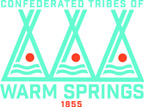There are two ways for a person to become a member of the Confederated Tribes of Warm Springs.
A person can be automatically enrolled, or adopted by the tribal membership.
The adoption process has proven to be difficult, because of the 50-percent voter participation requirement. The last two adoption elections have failed because they did not meet the 50-percent turnout.
Fifty-percent is a difficult voting standard: The average voter turnout in the U.S. overall, for instance, is about 40 percent in most elections.
In the case of the adoption elections, some voters may choose not to participate as a way of casting a no vote, making the 50-percent mark even harder to reach.
Another approach to enrollment is the enrollment baseline. Families this year will be asked for their opinion on the issue.
If the baseline were adjusted from the current base year of 1960 to some later year, then some non-member descendants of tribal members would become eligible for automatic enrollment.
To be automatically enrolled, a person must have a parent who is a tribal member, and count at least one-quarter blood of the Confederated Tribes of Warm Springs.
The tribes decide how to define the one-quarter standard, as the tribal Constitution does not specify how to arrive at the calculation.
In the past, the baseline was the year 1940: For anyone with tribal enrollment in that year, their amount of Indian blood was considered blood of the Confederated Tribes of Warm Springs. The quantum for a descendant of that person was calculated accordingly.
Later, the baseline was changed to 1960. This change allowed descendants to re-calculate their blood quantum, and some people became automatically enrolled.
A question for the membership is whether to re-adjust the baseline. This would result in some people becoming automatically enrolled.
Tribal Council is scheduled to hold an enrollment workshop this month on enrollments.
An informational presentation will be available to the membership soon on the issue, said Lynn Davis, director of tribal Administrative Services.


